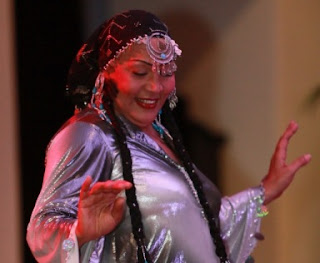
I have just recently returned from the Winter Warm Up in Brisbane . This year’s guest teacher was Aida Nour. It was well worth the time and money – as it has been for each of the last 14 years I have attended.
Why I Attend Workshops
Every year I learn something new – which makes me smile at those who have learnt it all in a year or so. Am I just thick or did they really have better and more experienced teachers than Aida Nour, Denise Enan, Dr Mo Geddawi, Yousry Sharif, Mohamed Kazafy or Lubna Emam? I suspect it is a case of “unknown unknowns”. Seems many belly dance teachers today know only the surface of the dance. They don’t know its history, any folkloric styles, and have limited understanding of Arabic (or Turkish) music and how to interpret it. No surprise than that they soon run out of things to teach. Worse, when one of their students decides to start teaching …
I go partly as it is a chance to learn from the source of the dance unmediated by western bias. All the Winter Warm Up teachers (apart from Bobby Farrah) have been Egyptian born with a long history in professional belly dance. They can dance Orientale. They also know Egyptian folk styles – the movement vocabulary, the music and the costuming.
But also the format means you get a chance at depth you can never get with one or two short workshops. Over four (or even better eight) days you can begin to see patterns in the way a dancer works. Something you couldn’t get on day one, snaps into focus on the third day, for example. Some years we have worked on the same piece for two days. Ten hours concentrated work on a dance certainly helps cement it into your muscle memory.
There is also the sense of community. Once a year you get to met in person with those who share a passion for Egyptian belly dance. A rare breed. It’s great to be surrounded by people who can discuss the evolution of Egyptian dance or who understand that milaya lef was created by Mahmoud Reda and can compare different interpretations.
Finally, in New Zealand I have a very limited pool of teachers who I can gain much from. Either they are involved in styles I have no interest in or their own knowledge is less than my own. Attending workshops gives me something to stretch me and something I can work on for a few months.
Why Do So Few Attend (Challenging) Workshops?
So why don’t more teachers (especially) attend more challenging workshops? Access is an issue. The Winter Warm Up is in Australia which means a passport, time off work and family, money for workshops, accommodation and travel. There are few “grown-up” workshops for belly dance in New Zealand (with would be more accessible). Yes, we have had Cassandra’s Oasis Dance Camp – but only twice. Other international teachers do make it to New Zealand but invariably they tone their material down to reach as wide a catchment as possible. The problem would be that we are a small country and are unable to pull the numbers needed for a solid, extending workshop.
But wait a minute! We have thousands of belly dancers in New Zealand. I, alone, can think of 80 teachers here. True some of them would only be interested in Tribal workshops – but that is only a small proportion. If half of the teachers were willing to attend a workshop there would be the numbers to bring someone with a lot of experience to New Zealand. But you have to ask how many of those teachers would be capable of handling 4 or 5 hour days? I still remember my surprise at the Oasis Dance Camp when at least two teachers were buggered after about an hour’s dancing.
One must consider whether a desire not to be “shown up” is part of the reason some people don’t attend workshops. Personally, I rarely see anyone else in a workshop – I’m too busy working on my own stuff. With Aida I was surprised when she split the class in half so each could dance for the other and I discovered dancers I deeply admired had problems too. One had difficulty remembering the choreography. Another had a lousy shoulder shimmy. A third couldn’t modify her style to match the style we were meant to be performing. I don’t see them as any less a dancer, but it reinforces that we all have things we need to work on.
Another possible reason is that some dancers think they know all there is to know. They don’t attend workshops because they don’t think they need to. In some cases they may have a deeply flawed concept of what they do and do not know. For others they may have attended a workshop that was badly labelled – for instance a “professional workshop for advanced dancers” taught by someone with poor dance skills and no teaching ability. Correctly judging they could do better, they then avoid workshops in the future as a waste of time.
Meet the Challenge
To all of you, I say, you have to keep pushing the limits. It is extremely rare to improve without some outside stimulus. Talk to other dancers who have similar interests and find out what is worth going to. If you want to get out of the rut, start saving money and leave so you can do at least one challenging workshop every year or two.
